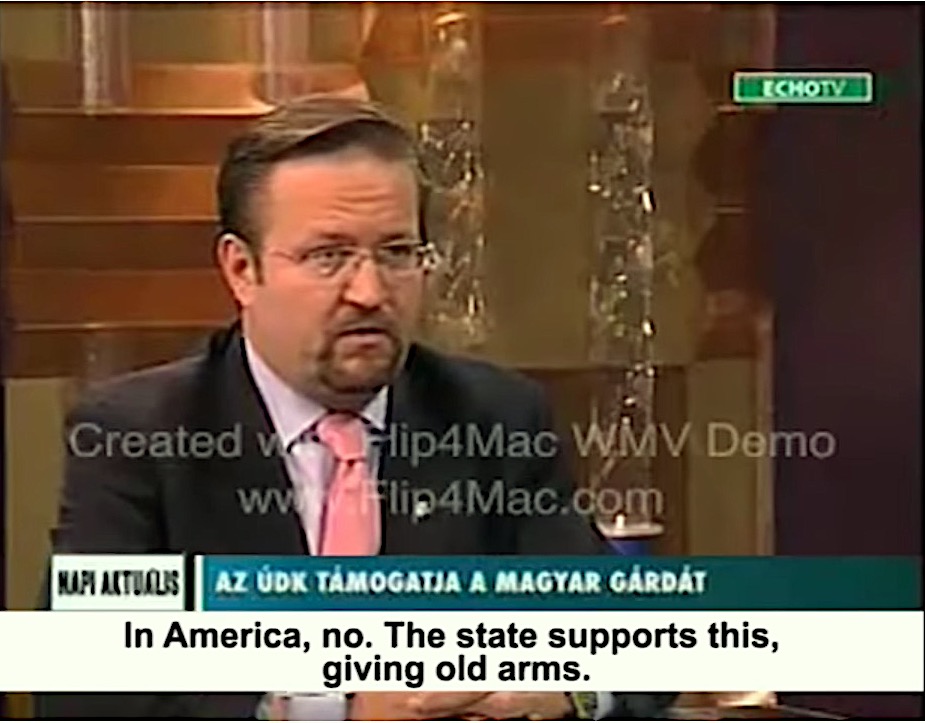Trump counterterrorism adviser Gorka voiced support for a Hungarian militia quickly banned over racist violence


A free daily email with the biggest news stories of the day – and the best features from TheWeek.com
You are now subscribed
Your newsletter sign-up was successful
In 2007, Sebastian Gorka, now President Trump's controversial chief counterterrorism adviser, was the leader of a new right-wing party in his parents' native Hungary, trying to peel votes away from the ultranationalist and anti-Semitic Jobbik party and current Prime Minister Viktor Orbán's Fidesz (Hungarian Civic Alliance) party. Gorka formed his New Democratic Coalition (UDK) with former Jobbik members, and Jobbik at the time was on the verge of establishing a paramilitary militia, the Hungarian Guard (Magyar Gárda), banned by Hungary's top court in 2009 over its anti-Roma marches.
In an August 2007 interview on Hungarian TV unearthed by the Forward — which previously reported Gorka's apparent affiliation with ex-Nazi society Vitézi Rend — Gorka said he supports Jobbik's establishment of the Guard, calling it a response to "a big societal need," according to English translation of Gorka's comments. The Hungarian military "is sick," like "the state of Hungarian society," he said. "This country cannot defend itself." The UDK site then touted Gorka's interview, in a headline indicating UDK support for the Hungarian Guard.
The European Court of Human Rights upheld Hungary's ban on the Hungarian Guard in 2013 — the same year two Guard members were convicted for racially motivated murders of Hungarian Roma — saying the militia was promoting an "essentially racist" order, motivated by "the racial conflict between Hungarian majority and Roma minority."
The Week
Escape your echo chamber. Get the facts behind the news, plus analysis from multiple perspectives.

Sign up for The Week's Free Newsletters
From our morning news briefing to a weekly Good News Newsletter, get the best of The Week delivered directly to your inbox.
From our morning news briefing to a weekly Good News Newsletter, get the best of The Week delivered directly to your inbox.
At the time of Gorka's 2007 interview with EchoTV, Jewish groups were warning about the black-vested Hungarian Guard militia. And though Gorka has written for "a far-right, anti-Semitic Hungarian publication, Magyar Demokrata — whose editor-in-chief was one of the Guard's founding members," the Forward said, "there is no evidence that Gorka himself has ever engaged in overtly anti-Semitic acts or participated in any of the Guard's activities."
Gorka did discuss militias in the U.S. during the interview, using them to defend the forming of the Hungarian Guard. When the interviewer asked him if it is "normal" for a political party in a developed democracy to form "in reality, a paramilitary group," Gorka said "it's completely natural" in places like Switzerland and Israel. "Even in America, where the largest and wealthiest military exists, there are such programs where people can access weapons almost for free if they attend an organized shooting training and always belong to an organization," he said, making clear he was not talking about the National Guard. You can read more and watch then entire 25-minute interview at the Forward.
A free daily email with the biggest news stories of the day – and the best features from TheWeek.com
Peter has worked as a news and culture writer and editor at The Week since the site's launch in 2008. He covers politics, world affairs, religion and cultural currents. His journalism career began as a copy editor at a financial newswire and has included editorial positions at The New York Times Magazine, Facts on File, and Oregon State University.
-
 Political cartoons for February 21
Political cartoons for February 21Cartoons Saturday’s political cartoons include consequences, secrets, and more
-
 Crisis in Cuba: a ‘golden opportunity’ for Washington?
Crisis in Cuba: a ‘golden opportunity’ for Washington?Talking Point The Trump administration is applying the pressure, and with Latin America swinging to the right, Havana is becoming more ‘politically isolated’
-
 5 thoroughly redacted cartoons about Pam Bondi protecting predators
5 thoroughly redacted cartoons about Pam Bondi protecting predatorsCartoons Artists take on the real victim, types of protection, and more
-
 Maxwell pleads 5th, offers Epstein answers for pardon
Maxwell pleads 5th, offers Epstein answers for pardonSpeed Read She offered to talk only if she first received a pardon from President Donald Trump
-
 Hong Kong jails democracy advocate Jimmy Lai
Hong Kong jails democracy advocate Jimmy LaiSpeed Read The former media tycoon was sentenced to 20 years in prison
-
 Ex-Illinois deputy gets 20 years for Massey murder
Ex-Illinois deputy gets 20 years for Massey murderSpeed Read Sean Grayson was sentenced for the 2024 killing of Sonya Massey
-
 Sole suspect in Brown, MIT shootings found dead
Sole suspect in Brown, MIT shootings found deadSpeed Read The mass shooting suspect, a former Brown grad student, died of self-inflicted gunshot wounds
-
 France makes first arrests in Louvre jewels heist
France makes first arrests in Louvre jewels heistSpeed Read Two suspects were arrested in connection with the daytime theft of royal jewels from the museum
-
 Trump pardons crypto titan who enriched family
Trump pardons crypto titan who enriched familySpeed Read Binance founder Changpeng Zhao pleaded guilty in 2023 to enabling money laundering while CEO of the cryptocurrency exchange
-
 Thieves nab French crown jewels from Louvre
Thieves nab French crown jewels from LouvreSpeed Read A gang of thieves stole 19th century royal jewels from the Paris museum’s Galerie d’Apollon
-
 Arsonist who attacked Shapiro gets 25-50 years
Arsonist who attacked Shapiro gets 25-50 yearsSpeed Read Cody Balmer broke into the Pennsylvania governor’s mansion and tried to burn it down
